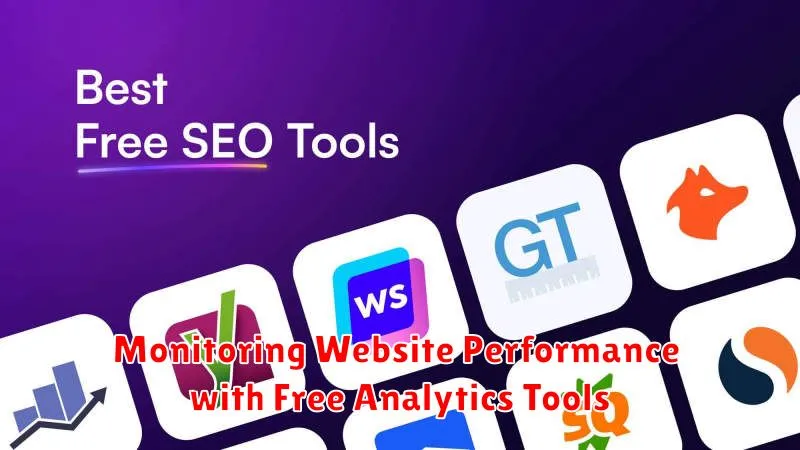In today’s digital landscape, a strong online presence is crucial for any business or individual seeking visibility and growth. Search Engine Optimization (SEO) plays a pivotal role in achieving this, enabling websites to rank higher in search engine results pages (SERPs) and attract organic traffic. While professional SEO services can be costly, a plethora of free SEO tools are available, offering powerful functionalities to unlock your website’s SEO potential. This article delves into the realm of free SEO tools, exploring the best options available to empower your SEO strategy and propel your online success.
Navigating the complex world of SEO can be daunting, especially for beginners. Fortunately, numerous free SEO tools provide user-friendly interfaces and valuable insights to streamline the optimization process. From keyword research and competitor analysis to site audits and backlink tracking, these tools equip you with the necessary resources to improve your website’s visibility and drive organic traffic. Discovering the right free SEO tools that align with your specific needs can significantly enhance your SEO efforts without breaking the bank. Join us as we explore the best free SEO tools available, empowering you to unlock your website’s full SEO potential.
Understanding the Importance of SEO
Search Engine Optimization (SEO) is crucial for enhancing online visibility. In today’s digital landscape, a strong online presence is essential for business success. SEO helps your website rank higher in search engine results pages (SERPs), driving organic traffic and increasing brand awareness.
Improved Search Engine Rankings translate directly into increased visibility. When your website appears higher in search results for relevant keywords, potential customers are more likely to find you.
Organic Traffic is invaluable. Unlike paid advertising, organic traffic comes from users actively searching for information related to your products or services. This targeted traffic is more likely to convert into leads and sales.
SEO contributes to building brand credibility and trust. Users often associate higher rankings with authority and trustworthiness, strengthening your brand image and increasing customer confidence.
Exploring Free Keyword Research Tools
Keyword research forms the foundation of any successful SEO strategy. Fortunately, several free tools can provide valuable insights into keyword relevance, search volume, and competition.
Google Keyword Planner, though primarily designed for paid campaigns, offers useful keyword ideas and search volume data. It can help you understand what users are searching for and the potential traffic associated with those keywords.
Ubersuggest provides a free version that allows for limited keyword research, offering data on keyword overview, content ideas and keyword ideas. Its user-friendly interface makes it a good starting point for beginners.
Wordtracker offers free keyword suggestions in a free trial. This tool helps identify relevant keywords alongside search volume metrics, allowing you to refine your target keywords effectively.
By utilizing these free tools, you can gain a solid understanding of relevant keywords to incorporate within your content and website optimization efforts. Remember to prioritize keywords with a balance of reasonable search volume and manageable competition.
Utilizing Free On-Page Optimization Tools
On-page optimization is crucial for search engine visibility. Fortunately, several free tools can significantly enhance your on-page SEO efforts. These tools empower you to refine various elements directly within your website to improve rankings and user experience.
Meta Tag Generators assist in crafting compelling and informative meta descriptions and title tags. These concise snippets of text appear in search results, influencing click-through rates. A well-written meta description can entice users to visit your site.
SEO Analyzers offer comprehensive website audits, highlighting areas needing improvement. These tools scan your pages for issues related to keyword density, heading structure, and other on-page factors. Addressing these identified areas can boost your search performance.
Readability checkers ensure your content is clear, concise, and easy to understand. They analyze sentence structure, word choice, and overall complexity, suggesting improvements for better user engagement. Improved readability contributes to a positive user experience.
Leveraging Free Off-Page Optimization Tools
Off-page SEO focuses on building your website’s authority and reputation through external signals. While many associate off-page SEO with backlink building, which can be challenging without paid tools, several free resources can assist with other crucial aspects.
Analyzing Backlink Profiles
While obtaining backlinks directly might be difficult without paid tools, analyzing existing backlink profiles is possible. Free tools can help you understand your competitors’ backlink strategies, identify potential link building opportunities, and assess the quality of your existing backlinks. This competitive analysis provides valuable insights for refining your overall SEO strategy.
Social Media Management
Social media plays a vital role in off-page SEO. Utilizing free social media management platforms allows for efficient scheduling, content distribution, and engagement tracking. While not directly impacting search rankings, a strong social presence enhances brand visibility and drives traffic to your website, indirectly contributing to SEO performance.
Monitoring Brand Mentions
Tracking brand mentions across the web can be achieved using free tools. Monitoring these mentions allows you to engage with your audience, address concerns, and identify potential link building opportunities or collaborations. This active participation enhances brand reputation and builds valuable relationships, which can indirectly benefit your SEO efforts.
Monitoring Website Performance with Free Analytics Tools

Effectively monitoring website performance is crucial for understanding SEO success. Free analytics tools provide valuable insights into user behavior, traffic sources, and overall website health, empowering you to make data-driven decisions.
Google Analytics remains the industry standard, offering comprehensive data on website traffic, user demographics, and engagement metrics. Tracking key performance indicators (KPIs) such as bounce rate, time on page, and conversion rates allows you to identify areas for improvement and measure the impact of SEO efforts.
Google Search Console complements Google Analytics by providing data directly from Google’s search index. It highlights how Google views your site, including indexing issues, crawl errors, and search queries leading users to your website. Monitoring these aspects helps optimize website structure and content for improved search visibility.
Conducting a Comprehensive SEO Audit with Free Tools
A comprehensive SEO audit is crucial for identifying areas for improvement and maximizing your website’s visibility. Fortunately, several free tools can help you conduct a thorough audit without breaking the bank.
Start by analyzing your website’s technical SEO health. Tools like Google Search Console provide invaluable data on crawl errors, indexing issues, and mobile usability. Addressing these technical aspects is foundational for strong SEO performance.
Next, evaluate your website’s content. Free tools can analyze keyword density, identify content gaps, and even suggest relevant long-tail keywords to target. This allows you to optimize existing content and develop new content strategically.
Finally, examine your backlink profile. While comprehensive backlink analysis often requires paid tools, free versions can offer insights into the number and quality of backlinks pointing to your site. Understanding your backlink profile helps identify potential toxic backlinks and opportunities for building high-quality links.
Staying Up-to-Date with SEO Trends and Best Practices

The digital landscape is constantly evolving, and so are SEO best practices. Staying informed about the latest trends is crucial for maintaining and improving your website’s visibility.
Google’s algorithm updates are a major driving force behind SEO changes. Following reputable SEO news sources and official Google announcements is essential. This allows you to adapt your strategies proactively and avoid penalties.
Industry blogs and forums are valuable resources for understanding current trends. Engaging with the SEO community can offer insights into effective techniques and emerging best practices.
Subscribing to SEO newsletters from trusted sources can deliver condensed information directly to your inbox, ensuring you’re aware of important updates and shifts in the SEO world. This proactive approach helps maintain a competitive edge in search rankings.
Integrating Free SEO Tools into Your Workflow
Effectively integrating free SEO tools into your existing workflow requires a strategic approach. Begin by identifying key areas where these tools can offer the most impact. This could include keyword research, on-page optimization, or technical SEO.
Next, select tools that align with your specific needs and integrate them seamlessly into your daily or weekly tasks. For instance, incorporate a keyword research tool into your content planning process. Schedule regular website crawls with a technical SEO tool to identify and address any issues promptly.
Track your progress and the impact of using these tools. This will help you refine your strategy and optimize the usage of free SEO tools over time. Regularly evaluate the effectiveness of the tools and replace them if better alternatives emerge. This ensures your workflow remains efficient and leverages the most effective free resources available.
Collaboration is key. Ensure your team understands how to utilize these tools and shares data effectively. Documenting your SEO processes and the role of each tool can significantly enhance team productivity and maintain consistency across your SEO efforts.

